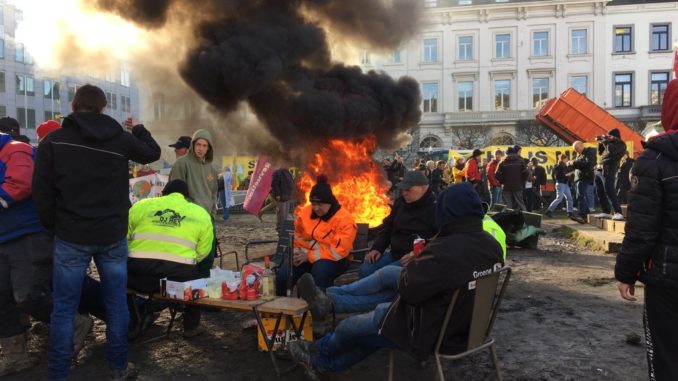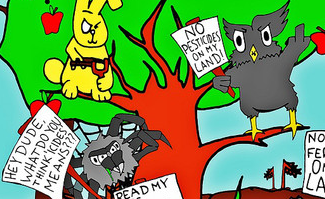
The European Commission has once again granted a temporary exemption to environmental requirements in the EU farming subsidies programme for 2024 in efforts to appease EU farmers, despite acknowledging the EU executive does not yet have a clear picture of the impact of the previous derogations. Natasha Foote reports.
The decision to derogate, which was announced on Wednesday (31 January), means farmers can temporarily opt out of a measure which requires them to set aside a portion (4%) of their land for biodiversity in order to qualify for funding from the EU’s Common Agricultural Policy (CAP).
Farmers will instead be able to use that space to grow certain plants deemed beneficial – including nitrogen fixing crops and catch crops – on 7% of their land. These crops can serve as fodder for animals, or as green manure, and must be grown without the use of plant protection products.
The news was also packaged with a proposal to extend the current liberalisation of imports from Ukraine for one year with additional safeguard measures on certain agrifood products; namely eggs, poultry and sugar. This is a key point of contention for the agrifood sector after an influx of goods from the war-torn country into the EU market drove prices down and heaped pressure on EU farmers.
“The Commission believes taking this stabilising action can help alleviate the pressure we know farmers are feeling so they can stay economically viable in this time of high uncertainty,” Maroš Šefčovič, Commission Executive Vice-President for EU Green Deal, said during a press conference announcing the decision.
This is not the first time the Commission has made such a move. The EU previously allowed temporary derogations from certain CAP environmental requirements in both 2022 and 2023 to loosen rules on both crop rotation and the use of fallow land.
CAP Environmental Derogations: What is the Impact on Food Security?
This year’s decision to derogate comes on the back of a spate of farmers protests across the EU over escalating environmental demands, rising costs, and a lack of a level playing field when it comes to agricultural imports. These protests have now made their way up to the home of the EU executive, with farmers mobilising in Brussels on Thursday (1 February).
However, the sweetener package has not had a favourable reception from either side of the coin.
For EU farmers association Copa-Cogeca, the move is ‘too little, too late’ and does not go far enough in protecting EU farmers. The association, who has repeatedly pushed for further derogations from other environmental measures – the so-called ‘GAECs’ 6, 7 and 8, has since called for “common action” to address the “severe difficulties” faced by farmers.
On the other hand, environmentalists lambast the Commission for sacrificing sustainable farming ambitions on the altar of food security, with conservation biologist Guy Pe’er labelling it “nonsense politics”.
“Evidence shows that the derogation on ecological focus areas had *no* contribution to food production, yet now they want to extend the exemptions from good practices,” he posted on X, while Birdlife’s Director Ariel Brunner called it “another day of shame” which “further locks farmers into dependency on [the] chemical industry”.
Show me the numbers
The announcement threw up questions as to the impact of the previous derogations – something that is as yet unclear by the Commission’s own admission.
“We are still receiving information about the use of this derogation last year,” Šefčovič told reporters when questioned, adding that an analysis will be publicly shared once it is completed.
An official added that comparisons are difficult given that the 2022 derogation fell under the previous CAP legal framework. Meanwhile, for last year’s derogation, member states are only required to report figures from mid-February.
“We need a bit of time to process, but we will, of course, compile them and make them available,” the official said.
Legal basis
The decision to derogate immediately sparked questions over its legality. This is because EU agriculture Commissioner Janusz Wojciechowski previously stated that, as previous derogations were an “exceptional situation”, the EU executive “does not have the right to take another implementing decision on this” and that additional exemptions would require “the whole legislative procedure”.
Questioned as to the legality of the move, an official confirmed that the Commission “cannot re-conduct the same urgent measure in the same way for two years in row”. However, he maintained that the move is valid given that they differ in both substance and the justifications behind the decisions.
“[The] justification for 2023 is different than the one we used before and that is why, for the year ahead, these make the difference in terms of the legal reasoning,” he said, pointing out that a year ago it was “the pressure and risk in terms of food security” at the time due to the war.
“Now we’re in a context where it’s more the pressure on farmers’ income and […] also very extreme climate events in 2023, which modified their plans. So the justifications were different a year ago than this year,” he said.
Meanwhile, the official points out that last year saw a full derogation from two separate environmental measures, while this year there is only a partial exemption from one measure.
However, the official added that, if a similar situation arises next year and the measure would be considered to be the same, then the Commission “could not use this special procedure again”.
More
‘Established democratic parties ignored problems of farmers for far too long’
Echoes of Discontent: Understanding the European Farmers’ Protests
CAP Strategic Plans and Food Security: Fallow Lands, Feeds, and Transitioning the Livestock Industry
ARC Lookahead – What’s on the EU agrifood policy menu in the coming months?
Plan to Loosen EU Rules on Genetic Technologies Passes First Parliament Hurdle
Leak – Belgian Presidency’s SUR-prising Hope for Pesticides Regulation






